Fleurs du Mal Magazine


Or see the index

The Sorrows of Young Werther (56) by J.W. von Goethe
DECEMBER 15.
What is the matter with me, dear Wilhelm? I am afraid of myself! Is not
my love for her of the purest, most holy, and most brotherly nature? Has
my soul ever been sullied by a single sensual desire? but I will make no
protestations. And now, ye nightly visions, how truly have those mortals
understood you, who ascribe your various contradictory effects to some
invincible power! This night I tremble at the avowal–I held her in my
arms, locked in a close embrace: I pressed her to my bosom, and covered
with countless kisses those dear lips which murmured in reply soft
protestations of love. My sight became confused by the delicious
intoxication of her eyes. Heavens! is it sinful to revel again in such
happiness, to recall once more those rapturous moments with intense
delight? Charlotte! Charlotte! I am lost! My senses are bewildered, my
recollection is confused, mine eyes are bathed in tears–I am ill; and
yet I am well–I wish for nothing–I have no desires–it were better I
were gone.
Under the circumstances narrated above, a determination to quit
this world had now taken fixed possession of Werther’s soul. Since
Charlotte’s return, this thought had been the final object of all his
hopes and wishes; but he had resolved that such a step should not be
taken with precipitation, but with calmness and tranquillity, and with
the most perfect deliberation.
His troubles and internal struggles may be understood from the following
fragment, which was found, without any date, amongst his papers, and
appears to have formed the beginning of a letter to Wilhelm.
“Her presence, her fate, her sympathy for me, have power still to
extract tears from my withered brain.
“One lifts up the curtain, and passes to the other side,–that is
all! And why all these doubts and delays? Because we know not what is
behind–because there is no returning–and because our mind infers that
all is darkness and confusion, where we have nothing but uncertainty.”
His appearance at length became quite altered by the effect of his
melancholy thoughts; and his resolution was now finally and irrevocably
taken, of which the following ambiguous letter, which he addressed to
his friend, may appear to afford some proof.
The Sorrows of Young Werther (Die Leiden des jungen Werther) by J.W. von Goethe. Translated by R.D. Boylan.
To be continued
fleursdumal.nl magazine
More in: -Die Leiden des jungen Werther, Goethe, Johann Wolfgang von
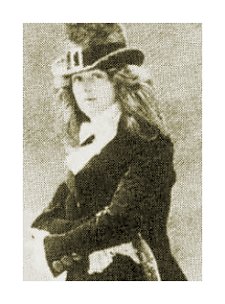
Renée Vivien
(1877-1909)
Je t’aime d’être faible…
Je t’aime d’être faible et câline en mes bras
Et de chercher le sûr refuge de mes bras
Ainsi qu’un berceau tiède où tu reposeras.
Je t’aime d’être rousse et pareille à l’automne,
Frêle image de la Déesse de l’automne
Que le soleil couchant illumine et couronne.
Je t’aime d’être lente et de marcher sans bruit
Et de parler très bas et de haïr le bruit,
Comme l’on fait dans la présence de la nuit.
Et je t’aime surtout d’être pâle et mourante,
Et de gémir avec des sanglots de mourante,
Dans le cruel plaisir qui s’acharne et tourmente.
Je t’aime d’être, ô soeur des reines de jadis,
Exilée au milieu des splendeurs de jadis,
Plus blanche qu’un reflet de lune sur un lys…
Je t’aime de ne point t’émouvoir, lorsque blême
Et tremblante je ne puis cacher mon front blême,
Ô toi qui ne sauras jamais combien je t’aime !
Renée Vivien poetry
fleursdumal.nl magazine
More in: Archive U-V, Renée Vivien, Vivien, Renée
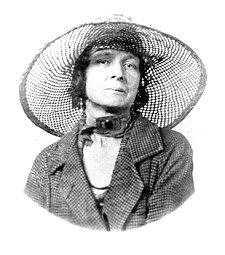
Elsa von Freytag-Loringhoven
(1874 – 1927)
SIMILARITY
CIVIL LAWS PRESSURE BY MEANS OF INTIMIDATION
FOR RETRIBUTION OF “WRONG”
IS BLACKMAILS IDENTICAL ACTION
TO CONINUE VIBRATINGLY GYRATING
EVOLUTION PROCESS’
PERPETUUM MOBILE.
ALL LIFE – SAVAGE – CIVILIZED IS BASED ON
IMMORTAL MOVEMENT
OF FORCE – CONTRAFORCE –
EACH IN RIGHT OF EIXTENCE –
EACH IN HOSTILE RELATIONSHIPS’ FAMILYFEUD –
INTERMINGLING – TO MERGE INTO STATE.
SOCIETY –
UNDERWORLD ACT FROM JUST PRINCIPLE OF
SELF PRESERVATION TO
– IN VAIN –
ANNIHILATE EACH OTHER –
FINALLY TO EMBRACE –
UNEHTICAL –
FOR UTILITY.
ETHICS IS SOCIETY’S AS UNDERWORLD’S
DIPLOMATIC MEANS TO
INSURE SAFETY’ –
EQUALLY ABANDONNED AS SENTIMENTAL SECOND
FOR DYNAMIC PRINCIPALITY:
EXPANSION.
AS FOAVRO SMILES – UNDERWORLD EMERGES SOCIETY UP –
BY REVERSE – SOCIETY PLUNGES UNDER.
SIMILAR METHODS DIFFER ON SURFACE
BY CONVENTIONS’ TIMEIMPOSED
LAWAPPLICATION LEGALIZED BY FORCE – VICTOR –
CRIMINAL – CRIMINAL VICTORIOUS –
RULER BY GRACE OF POWER –
BOMBASTICALLY PROCLAIMING EVERBOYD’S LAW
LAWFUL-L- FOR BUT HIS PARTY.
(MUSSOLINI.)
ALL IS IDENTICAL
PIOUS POMP – SOLEMN MUMMERY – GRACEFUL GESTURE –
RESPLENDENT VARNISH –
HYPOCRITICAL FIDDLESTICKS OF SOCIETY –
AS UNDERWORLD’S UNADORNED HONESTY
BUT THROB OF BASIC PRINCIPLE:
ROTATION.
E.V.F.L
Elsa von Freytag-Loringhoven poetry
fleursdumal.nl magazine
More in: Archive E-F, Dada, Freytag-Loringhoven, Elsa von
 Klankpoëzie, performance poëzie en visuele poëzie bij Underground Poetry Fest Jette (B)
Klankpoëzie, performance poëzie en visuele poëzie bij Underground Poetry Fest Jette (B)
Van vrijdag 19 tot en met zondag 21 september 2014 is Jette een weekend lang de internationale bakermat van de experimentele poëzie. U wordt meegevoerd naar de wereld van klankpoëzie, performance poëzie en visuele poëzie en overdonderd je met performances, tentoonstellingen, conferenties en workshops voor groot en klein.
Vrijdag start met een academische zitting over experimentele poëzie en opent de tentoonstelling met werk van visuele poëten. ’s Avonds is de avant-première van This is Belgian Chocolate van Philip Meersman. Zaterdag volgt de wonderlijke Dada-wereld van Maintenant #8 met Three Rooms Press uit New York en zondag wordt afgesloten met een Publiek Gedicht, de wereldberoemde Alain Arias-Misson trekt met een karavaan dichters door Jette en proclameert Het Onverenigd Koninkrijk België.
PROGRAMMA
Vrijdag 19/09 om 20.00 uur: lancering “This Is Belgian Chocolate” van Philip Meersman
Zaterdag 20/09 om 19.00 uur: lancering Maintenant #8 door Three Rooms Press
Zondag 21/09 om 10.00 uur: Het Onverenigd Koninkrijk België, een Publiek Gedicht door Alain Arias-Misson
Doorlopend: unieke expo concrete & visuele poëzie
WORKSHOPS
Zaterdag 20/9: 14.00 – 17.00
“poetry and performance” voor leerlingen van het secundair onderwijs in het Frans en Engels (door Slam Tribu). Meebrengen: pen en papier.
“Mysterieuze doos: een workshop visuele en sonore poëzie” voor kinderen uit het lager onderwijs (9-12 jaar) (concept: Maja Jantar)
Zondag 21/9: 10.00-12.00
“Graphic poetry” voor kinderen uit het lager onderwijs (6-9 jaar) (door Lies Van Gasse)
# Meer informatie op website Underground Poetry Fest
fleursdumal.nl magazine
More in: #Archive Concrete & Visual Poetry, #More Poetry Archives, Art & Literature News, Dada, EXPERIMENTAL POETRY, FLUXUS LEGACY, Poetry Slam
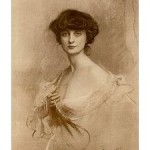
Anna de Noailles
(1876-1933)
La vie profonde
Être dans la nature ainsi qu’un arbre humain,
Étendre ses désirs comme un profond feuillage,
Et sentir, par la nuit paisible et par l’orage,
La sève universelle affluer dans ses mains !
Vivre, avoir les rayons du soleil sur la face,
Boire le sel ardent des embruns et des pleurs,
Et goûter chaudement la joie et la douleur
Qui font une buée humaine dans l’espace !
Sentir, dans son coeur vif, l’air, le feu et le sang
Tourbillonner ainsi que le vent sur la terre.
– S’élever au réel et pencher au mystère,
Être le jour qui monte et l’ombre qui descend.
Comme du pourpre soir aux couleurs de cerise,
Laisser du coeur vermeil couler la flamme et l’eau,
Et comme l’aube claire appuyée au coteau
Avoir l’âme qui rêve, au bord du monde assise…
Anna de Noailles poetry
fleursdumal.nl magazine
More in: Archive M-N, Noailles, Anna de
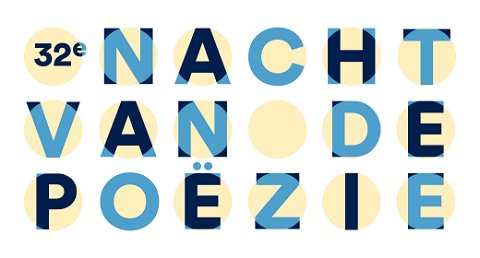
32ste Nacht van de Poëzie TivoliVredenburg Utrecht op 20 september 2014
Rufus Wainwright op de 32ste Nacht van de Poëzie: De wereldberoemde singer-songwriter Rufus Wainwright 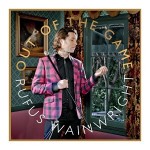 treedt op zaterdag 20 september op tijdens de 32ste Nacht van de Poëzie in TivoliVredenburg. Michaël Stoker, organisator van De Nacht: “We zijn ontzettend trots op dit optreden. Zijn vader Loudon Wainwright III heeft in 1992 ook opgetreden tijdens de Nacht van de Poëzie. Toen ik dat aan Rufus mailde en bleek dat het in zijn tourschema paste, wilde hij graag in de voetsporen van zijn vader treden. Een mooier programma kunnen we ons niet wensen, nu we voor het eerst weer terugkeren in de Grote Zaal van Vredenburg.”
treedt op zaterdag 20 september op tijdens de 32ste Nacht van de Poëzie in TivoliVredenburg. Michaël Stoker, organisator van De Nacht: “We zijn ontzettend trots op dit optreden. Zijn vader Loudon Wainwright III heeft in 1992 ook opgetreden tijdens de Nacht van de Poëzie. Toen ik dat aan Rufus mailde en bleek dat het in zijn tourschema paste, wilde hij graag in de voetsporen van zijn vader treden. Een mooier programma kunnen we ons niet wensen, nu we voor het eerst weer terugkeren in de Grote Zaal van Vredenburg.”
Rufus Wainwright staat bekend als één van de belangrijkste songwriters van deze tijd. Volgens Elton John is hij ‘the greatest songwriter on the planet’. Hij komt exclusief voor ‘de Nacht’ naar Nederland.
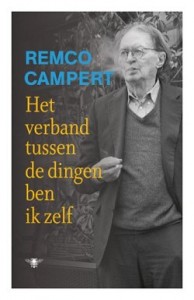 Het is onderdeel van de jarenlange Nacht-traditie dat muzikanten en andere artiesten als entr’actes enkele malen het stokje van de dichters overnemen tijdens de poëziemarathon. Andere acts zijn de Ashton Brothers, Maarten Heijmans zingt Shaffy, pianiste Daria van den Bercken en het negenkoppige tango-orkest Orquesta Típica Andariega.
Het is onderdeel van de jarenlange Nacht-traditie dat muzikanten en andere artiesten als entr’actes enkele malen het stokje van de dichters overnemen tijdens de poëziemarathon. Andere acts zijn de Ashton Brothers, Maarten Heijmans zingt Shaffy, pianiste Daria van den Bercken en het negenkoppige tango-orkest Orquesta Típica Andariega.
De dichterslijst van De Nacht is compleet. Dichters Andy Fierens, Jan Glas, Erik Jan Harmens, Florence Tonk en Max Temmerman zijn toegevoegd aan de in totaal 21 dichters die gaan optreden. Piet Piryns en Ester Naomi Perquin verzorgen de presentatie.
De gangen rond de Grote Zaal worden bezet door een boekenmarkt. Niet alleen kan men hier de bundels laten signeren, ook is daar gelegenheid tot eten en drinken. Alle bezoekers krijgen de exclusieve Nachtbundel, met daarin veel ongepubliceerd werk van de dichters.
Volledige dichterslijst: Wim Brands, Remco Campert, Bart Chabot, Andy Fierens, Jan Glas, Maarten van der Graaff, Erik Jan Harmens, Marjolijn van Heemstra , Judith Herzberg, Ingmar 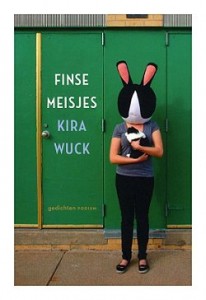 Heytze, Anton Korteweg, Els Moors, Leonard Nolens, Jean Pierre Rawie, Mustafa Stitou, Florence Tonk, Max Temmerman, Maud Vanhauwaert, Miriam Van hee, Menno Wigman & Kira Wuck.
Heytze, Anton Korteweg, Els Moors, Leonard Nolens, Jean Pierre Rawie, Mustafa Stitou, Florence Tonk, Max Temmerman, Maud Vanhauwaert, Miriam Van hee, Menno Wigman & Kira Wuck.
Entr’actes: Rufus Wainwright, De Ashton Brothers, Orquesta Típica Andariega, Maarten Heijmans zingt Ramses Shaffy, Daria van den Bercken.
32ste Nacht van de Poëzie
Zaterdag 20 september 2014
20.00 – ±03.00 uur
TivoliVredenburg, Utrecht
Meer informatie op website www.nachtvandepoezie.nl
fleursdumal.nl magazine
More in: Art & Literature News, MUSIC, Nacht van de Poëzie, Rufus Wainwright, THEATRE, Wuck, Kira
 Op woensdag 17 september is, als onderdeel van het Incubate-Festival, de Stedelijke Finale van de Tilburgse Poetry Slam Podiumvlees in de kleine zaal van De NWE Vorst. Tijdens deze Poetry Slam gaan de winnaars van de vier voorrondes de poëtische strijd met elkaar aan. Ook presenteert Podiumvlees, in samenwerking met uitgeverij teleXpress, tijdens de Stedelijke Finale de eerste overzichtsbundel. In deze bundel staat werk van alle dichters die het afgelopen seizoen meegedaan hebben aan Podiumvlees. De Finale van Podiumvlees vindt op woensdag 17 september vanaf 20.00 uur plaats in de kleine zaal van De NWE Vorst. De toegang is gratis.
Op woensdag 17 september is, als onderdeel van het Incubate-Festival, de Stedelijke Finale van de Tilburgse Poetry Slam Podiumvlees in de kleine zaal van De NWE Vorst. Tijdens deze Poetry Slam gaan de winnaars van de vier voorrondes de poëtische strijd met elkaar aan. Ook presenteert Podiumvlees, in samenwerking met uitgeverij teleXpress, tijdens de Stedelijke Finale de eerste overzichtsbundel. In deze bundel staat werk van alle dichters die het afgelopen seizoen meegedaan hebben aan Podiumvlees. De Finale van Podiumvlees vindt op woensdag 17 september vanaf 20.00 uur plaats in de kleine zaal van De NWE Vorst. De toegang is gratis.
In de eerste Stedelijke Finale van Podiumvlees gaan Romano Unheard, Nathalie van Meurs (foto), Hans d’Olivat en Josse Kok de strijd aan. Op het spel staat een plaats in het Nederlands Kampioenschap Poetry Slam, dat in januari 2015 gehouden wordt in Utrecht. De dichters worden beoordeeld door een vakjury en een publieksjury. De vakjury bestaat in ieder geval uit dichter Daan Doesborgh (winnaar NK Poetry Slam 2010) en Ernest Potters van Uitgeverij teleXpress.
 Naast de dichters die optreden in de slam zullen ook dichters uit de verschillende Nederlandse Poetry Circles acte de presence geven. D.J. Levi van Huijgevoort en Meandertaler verzorgen de muziek tijdens de Finale.
Naast de dichters die optreden in de slam zullen ook dichters uit de verschillende Nederlandse Poetry Circles acte de presence geven. D.J. Levi van Huijgevoort en Meandertaler verzorgen de muziek tijdens de Finale.
Podiumvlees is een initiatief van de Tilburgse slamdichters Martin Beversluis en Daan Taks. Zij gaan ook komend seizoen door met het organiseren van Podiumvlees. Daarom is Podiumvlees nog altijd op zoek naar nieuwe deelnemers. Wie meer informatie wil, kan op facebook terecht: www.facebook.com/podiumvlees
Incubate presenteert: Finale Podiumvlees Poetry Slam in De NWE Vorst Tilburg op woensdag 17 september 2014
fleursdumal.nl magazine
More in: #More Poetry Archives, Art & Literature News, Beversluis, Martin, Poetry Slam
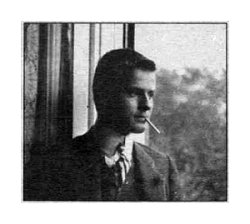
Hans Leybold
(1892-1914)
Auch ein Nekrolog
für Christian Morgenstern
O Christian, wir glätten weinend unsre Bügelfalten:
auf Feuerleitern krochen wir mit dir in rhythmische Gerüste.
Mit dem Zement der Ironie ausfülltest du die Spalten
vermorschter Traditionen Mauer. O metaphysisches Gelüste.
O Huhn und Bahnhofshalle! Weit entfernte Latten!
Ihr Wiesel, Kiesel, mitten mang det Bachjeriesel!
Palmström, du ohngeschneuzter, den sie kastrieret hatten!
Genosse Korf, du nie banaler Wennschon – Stiesel!
(Verzeiht den Kitschton. Mich übermannte hier die Rührung.
Verzeih besonders du, Kollege Untermstriche:
schon hab ich in der harten Hand der Verse Führung
wieder; und komme mir auf meine Schliche.) –
Nun quäkt der Turmhahn geil auf Staackmanns Miste
sein Kikriki, und ist bald Ernst, bald Otto.
Verleger reißen sich die Haare aus, als ob das müßte,
und spielen mit der Perioden-Presse trotzdem Lotto.
O Christian: wie später Gotik wandgeklatschter Freske
(im spitzen Reigen härmender sebastianischer Figuren):
du paßtest nicht in unsren Krämerkram, du fleischgewordene Groteske;
nicht schmiegte sich dein edler Vollbart in die Schöße unsrer Huren!
Das Literatenleben, o du mein Christian, ist doch nicht besser
als das ärarische. (Sie dichten zur Musik von Walter Kollo!)
Wir tanzen zwischen Film und Feuilleton auf scharfem Messer . . .
Freu dich! Sei tot! Grüß mir, im Glanz geölter Locken, den Apollo!
Hans Leybold poetry
fleursdumal.nl magazine
More in: *War Poetry Archive, Archive K-L, Hans Leybold, Leybold, Hans
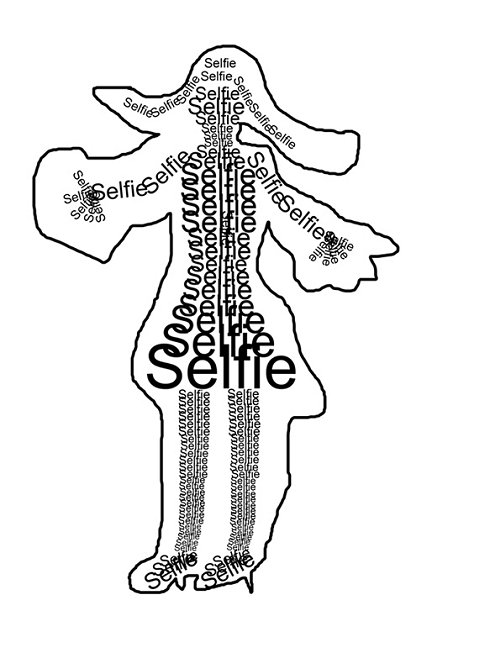
freda kamphuis ©2014:
selfie met omtrek
fleursdumal.nl magazine
More in: *Concrete + Visual Poetry K-O, Freda Kamphuis, Kamphuis, Freda
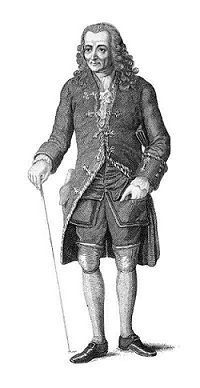
Voltaire
(1694-1778)
À Madame de Fontaine-Martel
Ô très singulière Martel,
J’ai pour vous estime profonde ;
C’est dans votre petit hôtel,
C’est sur vos soupers que je fonde
Mon plaisir, le seul bien réel
Qu’un honnête homme ait en ce monde.
Il est vrai qu’un peu je vous gronde ;
Mais, malgré cette liberté,
Mon cœur vous trouve, en vérité,
Femme à peu de femmes seconde ;
Car sous vos cornettes de nuit,
Sans préjugés et sans faiblesse,
Vous logez esprit qui séduit,
Et qui tient fort à la sagesse.
Or votre sagesse n’est pas
Cette pointilleuse harpie
Qui raisonne sur tous les cas,
Et qui, triste sœur de l’Envie,
Ouvrant un gosier édenté,
Contre la tendre volupté
Toujours prêche, argumente et crie
Mais celle qui si doucement,
Sans efforts et sans industrie,
Se bornant toute au sentiment,
Sait jusqu’au dernier moment
Répandre un charme sur la vie.
Voyez-vous pas de tous côtés
De très décrépites beautés,
Pleurant de n’être plus aimables,
Dans leur besoin de passion
Ne pouvant rester raisonnables,
S’affolier de dévotion,
Et rechercher l’ambition
D’être bégueules respectables ?
Bien loin de cette triste erreur,
Vous avez, au lieu de vigiles,
Des soupers longs, gais et tranquilles ;
Des vers aimables et faciles,
Au lieu des fatras inutiles
De Quesnel et de le Tourneur ;
Voltaire, au lieu d’un directeur ;
Et, pour mieux chasser toute angoisse,
Au curé préférant Campra,
Vous avez loge à l’opéra
Au lieu de banc dans la paroisse :
Et ce qui rend mon sort plus doux,
C’est que ma maîtresse, chez vous,
La liberté, se voit logée ;
Cette liberté mitigée,
À l’œil ouvert, au front serein,
À la démarche dégagée,
N’étant ni prude, ni catin,
Décente, et jamais arrangée ;
Souriant d’un souris badin
À ces paroles chatouilleuses
Qui font baisser un œil malin
À mesdames les précieuses.
C’est là qu’on trouve la gaîté,
Cette sœur de la liberté,
Jamais aigre dans la satire,
Toujours vive dans les bons mots,
Se moquant quelquefois des sots,
Et très souvent, mais à propos,
Permettant au sage de rire.
Que le ciel bénisse le cours
D’un sort aussi doux que le vôtre !
Martel, l’automne de vos jours
Vaut mieux que le printemps d’une autre.
Voltaire poetry
fleursdumal.nl magazine
More in: Archive U-V, MONTAIGNE, Voltaire

The Sorrows of Young Werther (55) by J.W. von Goethe
DECEMBER 12.
Dear Wilhelm, I am reduced to the condition of those unfortunate
wretches who believe they are pursued by an evil spirit. Sometimes I am
oppressed, not by apprehension or fear, but by an inexpressible internal
sensation, which weighs upon my heart, and impedes my breath! Then
I wander forth at night, even in this tempestuous season, and feel
pleasure in surveying the dreadful scenes around me.
Yesterday evening I went forth. A rapid thaw had suddenly set in: I
had been informed that the river had risen, that the brooks had all
overflowed their banks, and that the whole vale of Walheim was under
water! Upon the stroke of twelve I hastened forth. I beheld a
fearful sight. The foaming torrents rolled from the mountains in the
moonlight,–fields and meadows, trees and hedges, were confounded
together; and the entire valley was converted into a deep lake, which
was agitated by the roaring wind! And when the moon shone forth, and
tinged the black clouds with silver, and the impetuous torrent at
my feet foamed and resounded with awful and grand impetuosity, I was
overcome by a mingled sensation of apprehension and delight. With
extended arms I looked down into the yawning abyss, and cried,
“Plunge!'” For a moment my senses forsook me, in the intense delight of
ending my sorrows and my sufferings by a plunge into that gulf! And then
I felt as if I were rooted to the earth, and incapable of seeking an end
to my woes! But my hour is not yet come: I feel it is not. O Wilhelm,
how willingly could I abandon my existence to ride the whirlwind, or to
embrace the torrent! and then might not rapture perchance be the portion
of this liberated soul?
I turned my sorrowful eyes toward a favourite spot, where I was
accustomed to sit with Charlotte beneath a willow after a fatiguing
walk. Alas! it was covered with water, and with difficulty I found even
the meadow. And the fields around the hunting-lodge, thought I. Has our
dear bower been destroyed by this unpitying storm? And a beam of past
happiness streamed upon me, as the mind of a captive is illumined by
dreams of flocks and herds and bygone joys of home! But I am free from
blame. I have courage to die! Perhaps I have,–but I still sit here,
like a wretched pauper, who collects fagots, and begs her bread from
door to door, that she may prolong for a few days a miserable existence
which she is unwilling to resign.
The Sorrows of Young Werther (Die Leiden des jungen Werther) by J.W. von Goethe. Translated by R.D. Boylan.
To be continued
fleursdumal.nl magazine
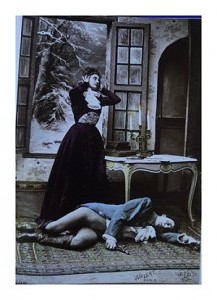
More in: -Die Leiden des jungen Werther, Goethe, Johann Wolfgang von
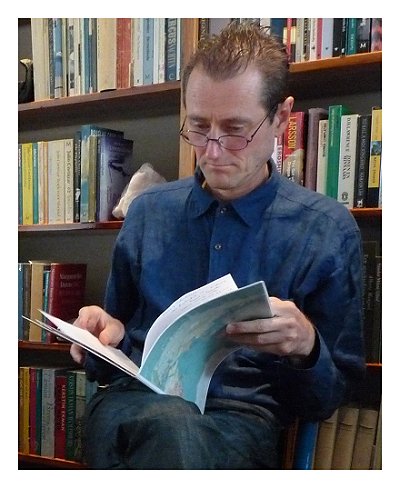
K. Michel (photo j. v. Kempen)
K. Michel
Voorop
voorop
zwemt een piepklein visje
dat gevolgd wordt door
een iets minder klein visje
waarachter eentje
van dertien in een dozijn zwemt
met in zijn spoor
een wat lijviger type
dat op de hielen wordt gezeten door
een tamelijk fors exemplaar
waarvan de sierlijke vinnen overigens
aan zomerjurkjes doen denken
deze nu wordt geschaduwd door
een ronduit groot te noemen vis
die op zijn bek
lorgnetvormige sprieten draagt
als een oude kassier
met in zijn kielzog echt een kanjer
ruw geschat groter
dan een torpedo kleiner
dan een rondvaartboot
maar wel met een spuitgat op zijn kop
en als iedereen dan eindelijk
keurig op een rij zwemt
gestreept gevlekt gespikkeld grijs groenblauw oranje smaragd
begint als door een onzichtbaar teken
– misschien doet de voorste wel blub –
van voor naar achteren het grote happen
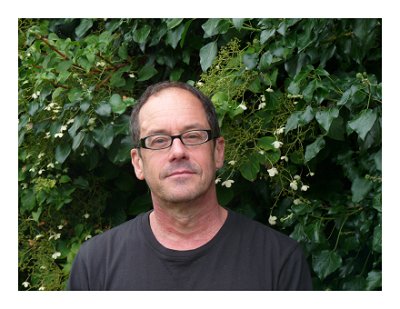
C.P. Naudé (photo C. v.d. Walt)
Charl-Pierre Naudé
Voorpunt
aan die voorpunt
swem ʼn piepklein vissie
gevolg deur
ʼn ietwat minder klein vissie
en nog ene agter hom
ʼn valetjie in ʼn honderd
ʼn raps lywiger soort
wat op sy hoede geplaas word
deur ʼn taamlik forse eksemplaar
waarvan die sierlike vinne trouens
aan somerrokkies herinner
en dié se spoor word nougeset gehou
deur pront gestel ʼn volronde vis
wat sy spriete soos die briltoutjies
van ʼn ou kassiere dra
met in sy kielsog sowaar ʼn knewel
by skatting groter
as ʼn torpedo kleiner
as ʼn rondvaartboot
maar darem met ʼn spuitgat op die kroon
en as almal oplaas
behoorlik in ʼn ry swem –
gestreep gevlek bespikkel grys
akwamarien oranje smarag –
begin asof ʼn teken gegee is
– miskien ʼn bloep deur die voorswemmer –
van voor na agter
die groot gebytery
Zuid-Afrikaanse vertaling van het gedicht ‘Voorop’ van K. Michel door Charl-Pierre Naudé
In de serie Vertaalvrucht nr. 7
fleursdumal.nl magazine
More in: Archive M-N, Charl-Pierre Naudé, K. Michel, Literaire Salon in 't Wevershuisje, Michel, K., Naudé, Charl-Pierre, VERTAALVRUCHT
Thank you for reading Fleurs du Mal - magazine for art & literature